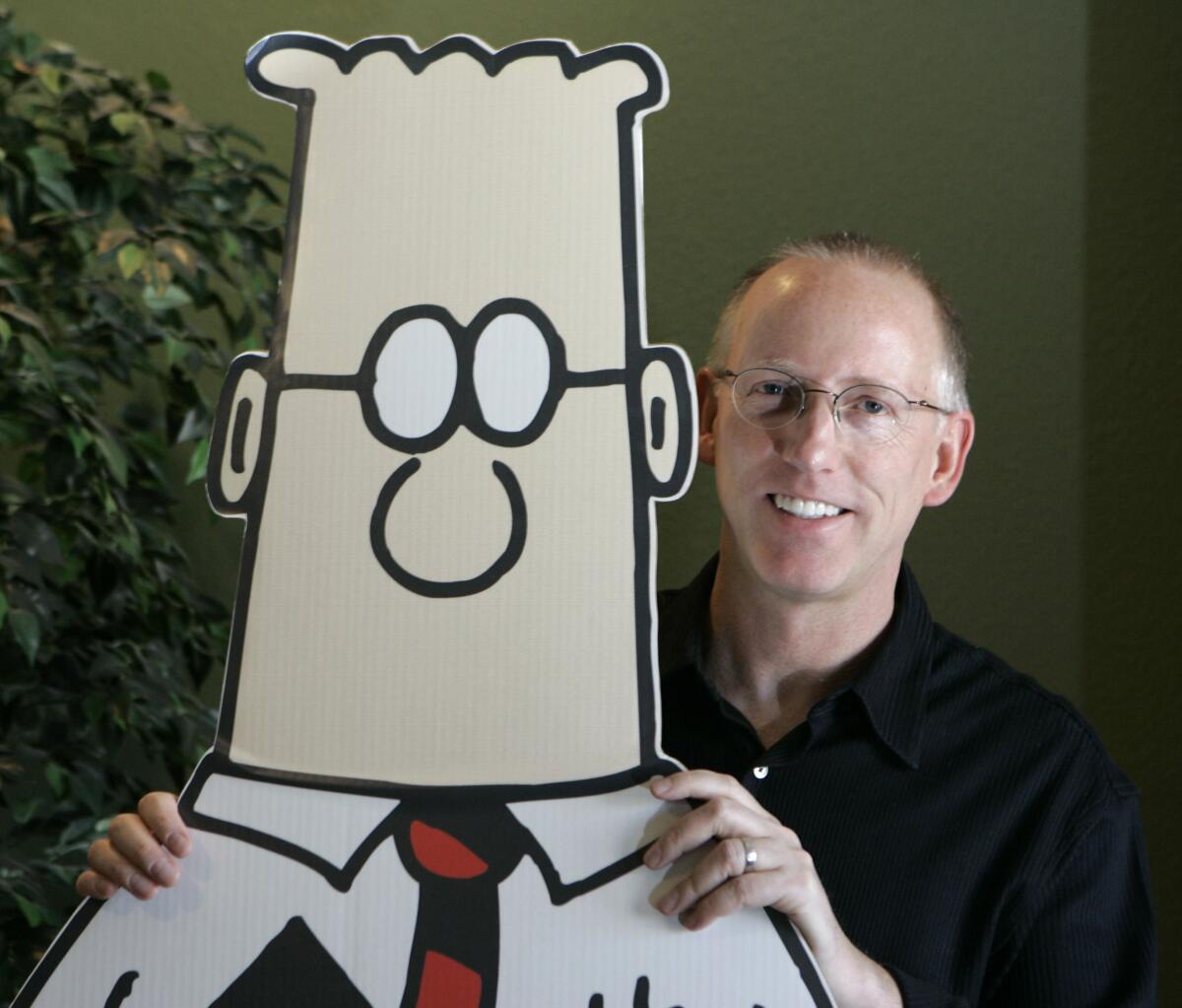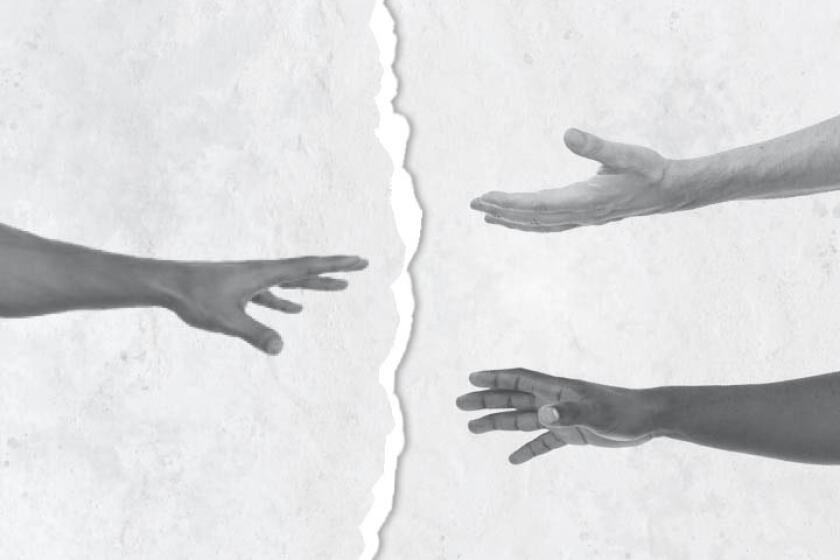Scott Adams says he was using hyperbole: America being âprogrammedâ to see race first

âDilbertâ cartoonist Scott Adams says there is a familiar story line behind the wave of consequences that hit him over the weekend after he made remarks that some people and companies, including the Los Angeles Times, deemed racist. Adams was axed by newspapers, his syndicate and his book publisher.
The cartoonist said Monday on his podcast âCoffee With Scott Adamsâ that he was using hyperbole, âmeaning an exaggeration,â to make a point. He said the stories that reported his comments pulled a trick:
âThe trick is just to use my quote and to ignore the context which I helpfully added afterwards,â he said. But he said that nobody would disagree with his two main points, which were âtreat all individuals as individuals, no discriminationâ and âavoid anything that statistically looks like a bad idea for you personally.â He also disavowed racists.
After the Highland Park parade shooting, cartoonist Scott Adams says parents have only two choices when dealing with troubled young men. Both are dark.
Adams, who said heâs a Democrat whoâs âleft of Bernie,â used his whiteboard later in the episode to sketch out how he thinks the cancel cycle worked in his case.
Last Wednesday on his YouTube livestream, he riffed off the results of a Rasmussen Reports poll that asked whether people agreed with the statement âItâs OK to be white.â Among Black respondents, 26% disagreed with the statement and 21% said they were not sure â a total of 47% who didnât think it was OK to be white.
The seemingly innocuous phrase âItâs OK to be whiteâ was co-opted in 2017 for an online trolling campaign that originated on discussion board 4chan and was aimed at baiting liberals and the media, the Anti-Defamation League said in a statement at the time. The phrase also has a history of use among white supremacists.
âIf nearly half of all Blacks are not OK with white people ... thatâs a hate group. And I donât want anything to do with them,â Adams said Wednesday. âAnd based on how things are going, the best advice I could give to white people is to get the hell away from Black people. Just get the fâ away. Wherever you have to go, just get away. âCause thereâs no fixing this. This canât be fixed.â
Lizzo tweeted that cancel culture has become âtrendy, misused and misdirectedâ and called on people to âfocus our outrage on the real problems.â
Adams then talked about moving to a neighborhood with a low concentration of Black people and referred to CNNâs Don Lemon, who is Black and who in 2013 noted the difference in the amount of litter between the predominantly white and predominantly Black neighborhoods he had lived in.
âSo I think it makes no sense whatsoever, as a white citizen of America, to try to help Black citizens anymore,â Adams continued. âIt doesnât make sense. Thereâs no longer a rational impulse. And so Iâm going to back off from being helpful to Black America, because it doesnât seem like it pays off. Like Iâve been doing it all my life and the only outcome is I get called a racist.â
The comic strip âDilbertâ was dropped by a number of newspapers â including The Times â shortly after Adams made those comments. On Sunday, his syndicate, which provided âDilbertâ to all outlets that published the comic, dropped him as a client entirely. And Penguin Random House on Monday nixed publication of his book âReframe Your Brain,â which would have come out in September.
Creator of the comic strip âDilbertâ refers to people who are Black as members of âa hate groupâ and urges white people to âget awayâ from them.
On Mondayâs 76-minute episode of his show, Adams said anyone who knows him would know he was using hyperbole and not commenting literally. He agreed that using a lone poll wasnât the best way to address the larger topic he wanted to talk about.
âI should have been more clear that I was using the poll as, letâs say, an introduction to the topic,â he said on Mondayâs show. âYou can take the poll out of the story and my point would be the same, but my messaging would probably be better.â

Adams said Monday that he would have presently the message differently had he not been speaking off the cuff. Then he proceeded to re-present it.
âWe know we have a situation in this country in which there are indications of racial discontent,â he said. He pointed to the recent Rasmussen poll and a Gallup poll from a while back that showed race relations âfalling off a cliffâ around the time that Trayvon Martin was killed in 2012.
Thatâs when, Adams said, the media discovered that stories about racial hatred âreally [get] people goingâ and were a way to attract customers and make money.
He also called attention to social media and diversity, equity and inclusion conversations at the corporate level as influences that were sending a message to Black Americans.
The company that distributes the âDilbertâ comic strip says it will no longer work with cartoonist Scott Adams because of his racist comments.
âTheyâre creating a narrative, collectively,â he said, and that narrative is that people are racist. âThereâs some amount of the Black population thatâs poisoned, they are just poisoned by the narrative. They are victims,â he added. Victims of âprogramming.â
The problem is that while there is âa lot of goodâ in conversations about DEI and the like, âif you havenât accounted for the cost of it, you havenât finished your analysis.â
The benefits, he said, are obvious. âHey, weâll treat everybody better, I like that.â But the cost is that white Americans are âdemonized by the collective forces hereâ and at least one of the predictable responses should be âto put some distance between people who have been victimized and are therefore weaponized.â
âWelcome to the rebellion,â actress Gina Carano said Friday as she revealed sheâll develop and produce a film for conservative pundit Ben Shapiroâs Daily Wire.
Adams says he didnât mean that Black Americans had literal weapons but rather that some had been intellectually programmed by social media and corporate media âto have an immediate racial frame on things that maybe you donât need a racial frame on.â He said white Americans were being similarly programmed when videos of Black people beating up other people go viral.
âWherever there are groups of people that have been programmed by the media to have a reflexive bad feeling about you, I would avoid them,â he said.
Adams explained the cancel cycle as starting with âthe crimeâ â the remarks he said last week.
Two cases of reflexive censure reversed: Harvard re-invites an Israel critic to take a fellowship. Hamline University regrets calling an art historian âIslamophobic.â
âI got canceled everywhere. There will be no more âDilbertâ except on the Locals subscription platform,â he said. âAnd then what happened? Then the cover-up starts. Because little by little, more voices are saying, âWait, what did you cancel him for? OK, I feel like Iâm not getting the whole context here.ââ
The Los Angeles Times said Saturday that it would no longer run Dilbert. âCartoonist Scott Adams made racist comments in a YouTube livestream Feb. 22, offensive remarks that The Times rejects,â the company said in a statement. âFurther, in the last nine months The Times has on four occasions printed a rerun of the comic when the new daily strip did not meet our standards.â
Comedy historian Kliph Nesteroff and comics Donnell Rawlings and Tiffany Haddish explain the origins of modern-day cancel culture and its historical equivalents.
The Times said a replacement comic would be launched soon and added, âThe Comics pages should be a place where our readers can engage with societal issues, reflect on the human condition, and enjoy a few laughs. We intend to maintain that tradition in a way that is welcoming to all readers.â
But Adams harshly criticized the media, particularly the Washington Post, for publishing details that he admits are factually true but framing them, in his opinion, in a way that gives an incorrect impression. The Post story â which appears to have been updated since Adams went live Monday on YouTube â referred to Adamsâ comments as âpromoting segregation.â
âThey introduce the topic by declaring it a racist rant or a racist tirade,â Adams said. âIf the title of the article says âracist rantâ or âracist tirade,â is the media telling you the news? Nope. Thatâs the narrative. Thatâs an interpretation is what that is.â
College students grapple with a question medieval theologians faced: Is repentance necessary before forgiveness is granted, or is mercy unconditional?
The cartoonist said that everyone who has canceled him has done so from their âfirst impressionâ of the situation. He admitted that what he said was âawkwardâ and could have been explained better.
Outlets are now reporting that he said all Black people are haters, Adams said.
âDid anybody hear me say that? ... So now theyâve turned it into âall.â Is there any scenario where Iâve ever said that all members of a group have something, one thing in common? Ever? Who would say that besides stupid people? This isnât even racist,â he said. âThat would just be stupid.â
On Tuesdayâs faith-focused âSoul of a Nation,â Nick Cannon talks about how heâs repenting rather than simply apologizing for anti-Semitic comments.
More to Read
The biggest entertainment stories
Get our big stories about Hollywood, film, television, music, arts, culture and more right in your inbox as soon as they publish.
You may occasionally receive promotional content from the Los Angeles Times.




















